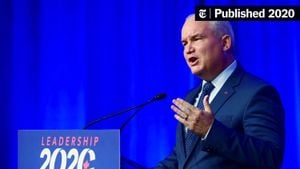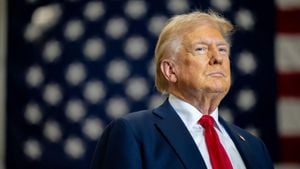Recent decisions by the Supreme Court of India are stirring significant reactions among the nation's religious communities, particularly surrounding tax policies on religious figures. This controversy has ignited debates about taxation, religious freedom, and public service, aligning closely with broader discussions on governmental approaches to education and faith-based organizations.
The Indian Supreme Court made headlines with its ruling on November 7, 2024, ending a long-standing policy exempting the salaries of Catholic nuns and priests from income tax within government-aided educational institutions. This ruling has not only disappointed many within the church but has also set the stage for potential nationwide repercussions. Father Xavier Arulraj, the legal secretary of the Tamil Nadu Catholic Bishops' Council, referred to the judgment as "very disappointing" and has indicated plans for appeal, citing the absence of detailed hearings surrounding their case.
This ruling could signal the beginning of new challenges for clergy who have historically enjoyed tax exemptions due to their vows of poverty and the nature of their service. The exemption policy first came about during the tail end of British colonial rule, officially established to recognize clergy's service to society back in 1944. Over the years, these policies shifted significantly, particularly with the 2015 amendment removing tax-exempt status for clergy salaries in Tamil Nadu, which reignited controversy.
Legal experts, including Arulraj, have noted the shock wave this ruling is expected to create, especially considering it follows various earlier court decisions. For example, clergy members had fought for years after the Tamil Nadu High Court ruled against tax collection on their salaries back in 2016. Their reasoning centered on the premise of their vows of poverty and the assertion they do not financially benefit from the income, as funds are directed to the diocese or religious congregation instead.
Compounding the issue are challenges faced by religious officials across the state of Kerala, where the struggle against income tax deductions began as early as 2014. Appeals by church representatives have been stymied as tax collection was reluctantly allowed by the Kerala High Court as of 2021, solidifying the legal stance against clergy exemptions.
Father Michael Pulickal, from the Kerala Catholic Bishops' Council, has echoed sentiments of disappointment. He noted the sense of urgency among clergy as they navigate these legal landscapes, indicative of the broader social and political climate impacting religious expression. He stated, "The tax process initiated by the government was unexpected and has systematically risen through the ranks of our churches without sufficient acknowledgment of clergy contributions to society.”
The Supreme Court’s ruling over tax exemptions for clergy isn't only about finances; it's intertwined with issues of religious freedom and autonomy for religious institutions. Members of the clergy, especially those associated with education and social services, are expressing concerns about the precedent this could set for other religious groups across the nation.
This situation has sparked various reactions from different corners of society, particularly focusing on the broader societal ramifications of the court's decision. Father Teles Fernandes, representing the Gujarat Board of Catholic Educational Institutions, stressed the need for vigilance beyond the local areas of Tamil Nadu and Kerala. He shared the concerns about how taxation policies could transcend state boundaries, potentially affecting the operations and funding of religious schools across India.
Underlying these appeals and reactions is the recognition of diversity within the religious community. The growing trend of legal challenges against taxation reflects the tension between state-imposed regulations and the autonomy of faith-based organizations. Many see the recent court rulings as encroachments on their freedom to practice and disseminate their faith without undue governmental influence.
The Supreme Court's decisions come at a time when religious figures are being questioned more rigorously about their societal roles and responsibilities. Some interpret the move to tax clergy salaries as part of broader governance strategies aimed at holding all sectors, including faith-based organizations, accountable under the same standards. Critics argue, though, this approach may inadvertently suppress religious freedoms and community service efforts, particularly by faith groups.
This tension can lead to larger societal fractures, as clergy and religious leaders are often at the forefront of community welfare initiatives. The concern here is about whether increasing scrutiny on religious finance will hinder their ability to support various social causes. Many are apprehensive about the chilling effect this could have on religious participation in social welfare—essentially delegitimizing some of the funding and resource networks religious institutions provide to their communities.
Public reactions to the Supreme Court's ruling are varied, with many members of the Catholic community expressing their determination to seek justice through appeals. The overall sentiment circles back to the principle of religious freedom, which many hold as sacred under the constitution. The possibility of legal review as Father Romy Chacko suggested serves as both hope and frustration as the people look for resolution to what they deem unfair taxation.
Across India, the question of religion, its intersection with policy, and such rulings' societal impacts continue to resonate. The Supreme Court's decision has opened up lines of debates touching on the relationships between government, citizens, and religious institutions embedded within the country’s cultural fabric.
Advocacy for continued exemptions is expected to gain momentum, especially as clergy and representatives solidify their strategies for appealing the court's ruling. With notable figures like Father Michael Pulickal and Father Xavier Arulraj leading the charge, the Catholic Church's legal battle against the taxation of clergy salaries appears only to be at its inception.
It remains to be seen how these legal challenges will play out within India’s judiciary system. For now, religious institutions are gearing up for what they deem to be pivotal battles not only for tax exemptions but for the broader rights of religious freedom and autonomy within the country as they seek clarity on how far the legal system will allow these entities to operate.



